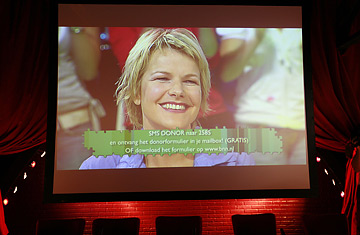
Donor "Lisa" is seen on a screen in a news room of public broadcaster BNN after the announcement that she is in fact an actress during the widely criticised Big Donor Show in Aalsmeer, the Netherlands, June 1, 2007.
When something seems utterly unbelievable, it perhaps ought not to be believed. Dutch television broadcaster BNN provoked an international uproar this week when it announced plans to air a live TV game show pitting rival kidney patients against one another in pursuit of a donor organ. But when the show ran on Friday, it proved to be a hoax.
The idea was "beyond even our standards," in the words of presenter Patrick Lodiers, referring to the notoriety the youth-oriented network has gained from previous controversial shows. But the network's stated intention had always been to raise awareness of the shortage of donor organs. "We wanted to make a statement," BNN chairman Laurens Drillich said in a press release after the show. "That worked. In the past seven days there has been more debate about organ donation than in the last seven years."
The show did not reveal itself as a hoax until near the end. Three candidates, each desperately needing a kidney transplant to remain alive, tried to convince a woman dying of a brain tumor why they should be the lucky recipient of one of her kidneys.
The organ donor was identified as "37-year-old Lisa," about to die of brain cancer. She proved to be an actress. The contestants, who were also in on the hoax, are real kidney-failure patients, BNN says.
"Watch how we do it," was BNN's reaction to all the criticism beforehand, claiming it "has shown in the past that we know how to deal with difficult issues like this, especially and foremost for a young audience." Asked by TIME on Wednesday whether the show was a hoax, the network flatly denied it.
In the show, run in BNN's trademark straight-talking style, included segments in which friends and relatives made the case for each of the contestants. All three contestants had previously received transplanted kidneys, but their bodies had rejected them.
"Lisa" also prepared questions for the contestants, such as "Would you accept a kidney from a serial killer?" In the last round, each contestant had 30 seconds to make a final claim. The hoax announcement was not made until after the first contestant was eliminated.
More than a thousand people are currently on the waiting list for a kidney in The Netherlands, while only 634 kidneys were transplanted in all of 2006. Despite concerted efforts by the government and medical organizations, the number of organ donors is insufficient to meet demand, and is even falling according to the latest figures.
BNN, a relatively small Dutch TV network, targets a youth audience, frequently using shock tactics. Recent shows have included on-air drug use, in an educational program on illicit substances, and a documentary in which young people facing death from incurable diseases tell about their lives and the social prejudices they encounter.
The network claims firsthand experience of the shortage of donor organs. Its founder, Bart de Graaff, died five years ago from kidney failure while on a waiting list for a transplant. The show was dedicated to De Graaff, and was punctuated with calls to the public to register as organ donors. The number of responses is not yet known.
The show received widespread media attention, including an article on TIME.com this week. Just before the show aired, Prime Minister Jan-Peter Balkenende remarked in his weekly press conference that the program hurts the image of the country abroad. Referring to the dozens of foreign media covering the show, he asked "if the country should be happy with this sort of publicity." A few days ago, some legislators had urged media minister Ronald Plasterk to stop the show. While calling the show "inappropriate and unethical," Plasterk said the constitution barred him from interfering with the content of public broadcasting.
The revelation that the show was a hoax did not seem to dismay him. "A fantastic stunt," was Plasterk's initial reaction after it aired. It remains to be seen whether all feedback will be as positive.
